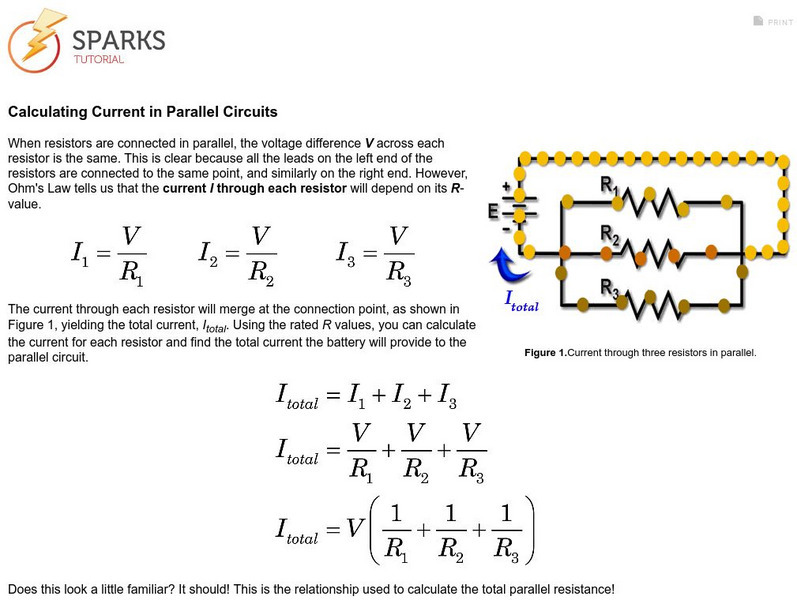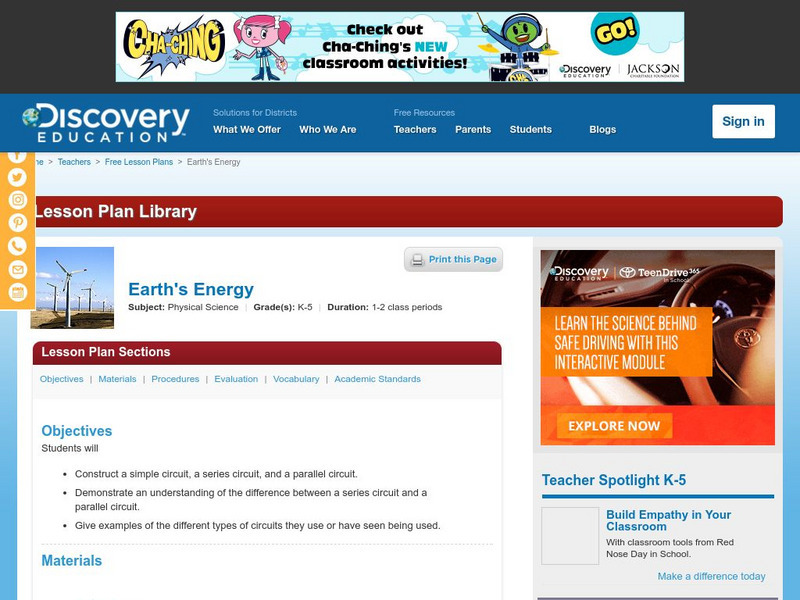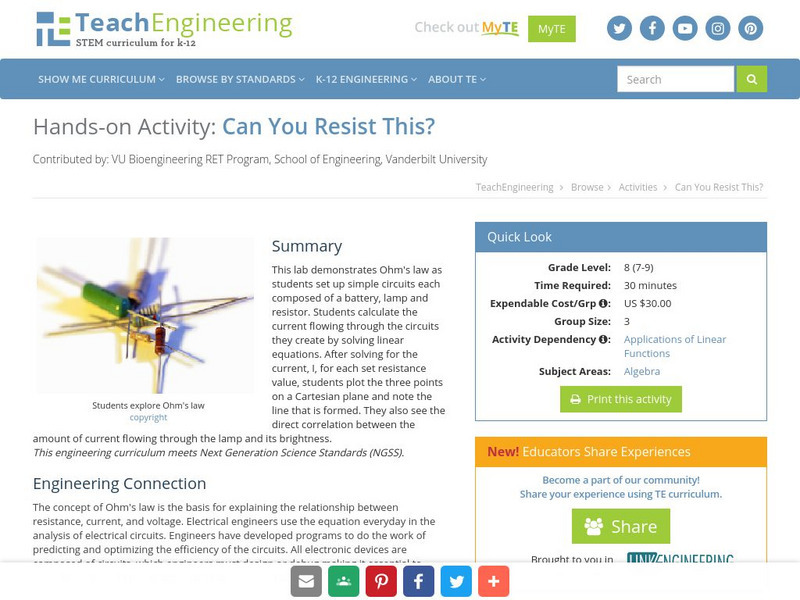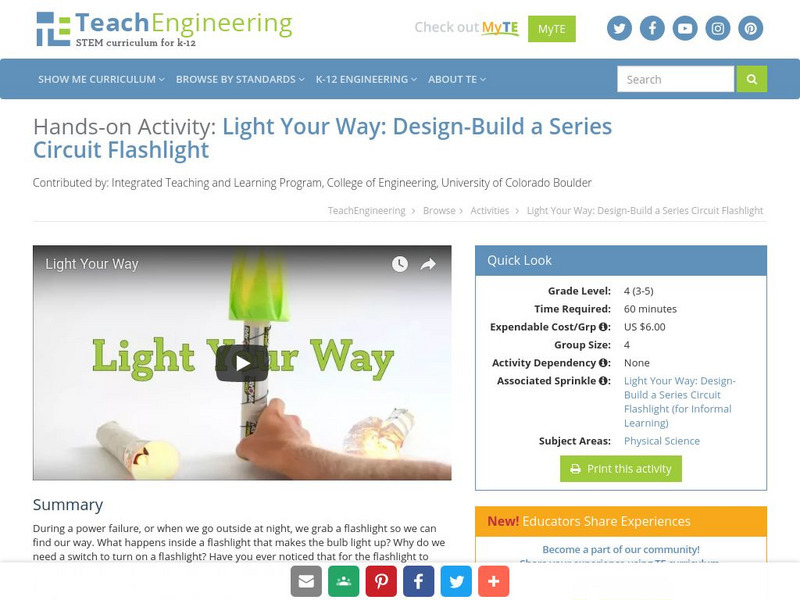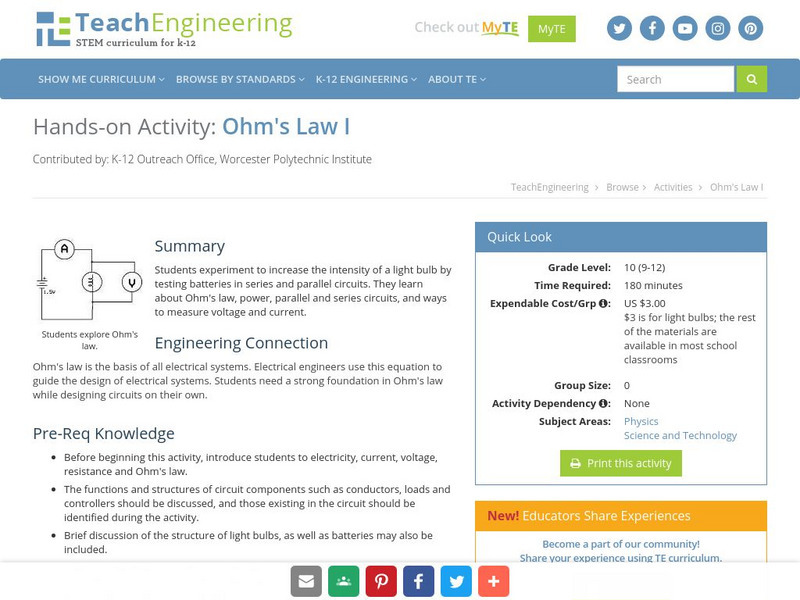Science Education Resource Center at Carleton College
Serc: Investigating Testing for Electrical Conductivity Using Materials
In this activity, students will understand that electricity moves through different circuits and discover what types of materials are conductors and insulators.
Concord Consortium
Concord Consortium: Measuring Voltage in Series Circuits
Measuring the voltage in a circuit is like measuring the drop in pressure across two points. Learn more with this tutorial.
Concord Consortium
Concord Consortium: Calculating Current in Parallel Circuits
Use Ohm's Law to calculate the current in parallel circuits.
Discovery Education
Discovery Education: Earth's Energy
A hands-on instructional activity for helping students understand simple circuits, series circuits, and parallel circuits, and the differences between the three.
TeachEngineering
Teach Engineering: How Does a Robot Work?
This lesson introduces electricity, batteries and motors using a LEGO MINDSTORMS NXT robot. The associated activity guides students to build a simple LEGO NXT set-up and see the practical implementation of the concepts discussed. Before...
Science and Mathematics Initiative for Learning Enhancement (SMILE)
Smile: Resistances in Series and Parallel Circuits
A teacher lesson plan is provided here. This page describes two activities in which the effect of multiple resistors on the current and overall resistance of both series and parallel circuits are investigated. Complete activity...
Science and Mathematics Initiative for Learning Enhancement (SMILE)
Smile: Simple Circuitry and Series Circuit
A teacher lesson plan which could be easily converted into an idea for a student project or presentation. This page describes an activity in which the basic nature of a circuit and the concepts of a series circuit are investigated....
Other
Articles About "Electricity": New Explanations, Alternate Mental Toolkit
This highly informative site contains many resources and articles on electricity. A wealth of information about electricity can be found. This site also contains many FAQ's.
Ducksters
Ducksters: Physics for Kids: Electronic Circuits
Kids learn about electronic circuits in the science of electricity and physics including schematics, power, ground, components, and the printed circuit board.
ClassFlow
Class Flow: Circuit Conductors
[Free Registration/Login Required] This unit builds on children's previous practical experience of making circuits and extends their understanding of circuits, conductors and insulators and the need for a complete circuit in order for a...
Science Education Resource Center at Carleton College
Serc: Learning the Science Behind Electricity
Following a PowerPoint lecture, students will participate in a laboratory investigation where they dissect a disposable camera.
TeachEngineering
Teach Engineering: Bulbs & Batteries Side by Side
We are surrounded everyday by circuits that utilize "in parallel" and "in series" circuitry. Complicated circuits designed by engineers are made of many simpler parallel and series circuits. In this hands-on activity, students build...
TeachEngineering
Teach Engineering: Can You Resist This?
This lab demonstrates Ohm's law as students set up simple circuits each composed of a battery, lamp and resistor. Students calculate the current flowing through the circuits they create by solving linear equations. After solving for the...
TeachEngineering
Teach Engineering: Light Your Way
When there is a power failure, or when we go outside at night, we grab a flashlight so we can find our way. What happens inside a flashlight that makes the bulb light up? Why do we need a switch to turn on a flashlight? Have you ever...
TeachEngineering
Teach Engineering: Conductivity
Students make a simple conductivity tester using a battery and light bulb. They learn the difference between conductors and insulators of electrical energy as they test a variety of materials for their ability to conduct electricity.
TeachEngineering
Teach Engineering: Ohm's Law I
Students will work to increase the intensity of a light bulb by testing batteries in series and parallel circuits. It analyzes Ohm's Law, power, parallel and series circuits, and ways to measure voltage and current.
Other popular searches
- Basic Electricity Circuits
- Electricity Circuits Current
- Electricity Circuits Safety
- Basic Electricity and Circuits
- Circuits Electricity
- Electricity Circuits Project
- Electricity Circuits Proiect




